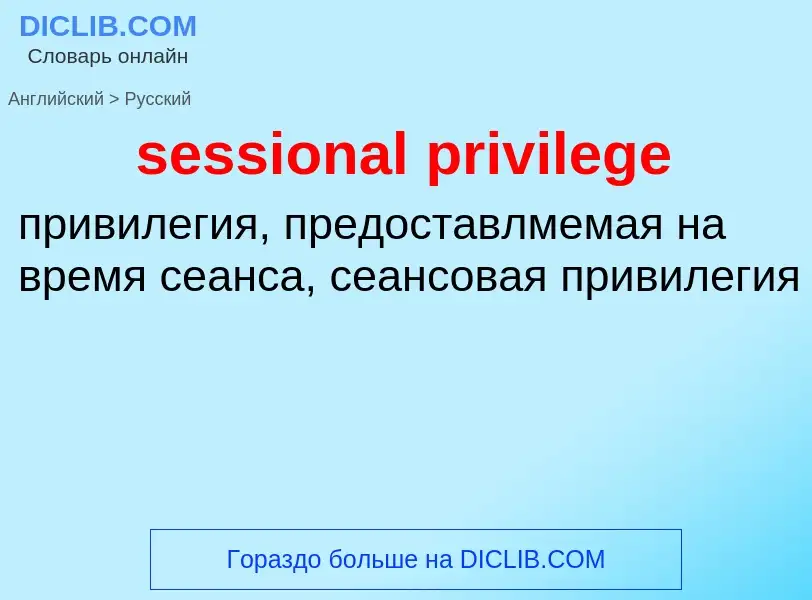Vertaling en analyse van woorden door kunstmatige intelligentie ChatGPT
Op deze pagina kunt u een gedetailleerde analyse krijgen van een woord of zin, geproduceerd met behulp van de beste kunstmatige intelligentietechnologie tot nu toe:
- hoe het woord wordt gebruikt
- gebruiksfrequentie
- het wordt vaker gebruikt in mondelinge of schriftelijke toespraken
- opties voor woordvertaling
- Gebruiksvoorbeelden (meerdere zinnen met vertaling)
- etymologie
sessional privilege - vertaling naar russisch
['privilidʒ]
общая лексика
преимущественное право, привилегия
существительное
['privilidʒ]
общая лексика
привилегия
преимущество
честь
юриспруденция
конфиденциальность
неразглашение (сообщений, сделанных подсудимым адвокату и т. п.)
финансы
особые права сторон по финансовому контракту (напр., опцион)
синоним
глагол
общая лексика
давать привилегию
(обыкн. from) освобождать (от какой-л. обязанности и т. п.)
разрешать что-л.
бывшее под запретом
освобождать (от чего-л.)
Definitie
Wikipedia
Executive privilege is the right of the president of the United States and other members of the executive branch to maintain confidential communications under certain circumstances within the executive branch and to resist some subpoenas and other oversight by the legislative and judicial branches of government in pursuit of particular information or personnel relating to those confidential communications. The right comes into effect when revealing the information would impair governmental functions. Neither executive privilege nor the oversight power of Congress is explicitly mentioned in the United States Constitution. However, the Supreme Court of the United States has ruled that executive privilege and congressional oversight each are a consequence of the doctrine of the separation of powers, derived from the supremacy of each branch in its area of constitutional activity.
The Supreme Court confirmed the legitimacy of this doctrine in United States v. Nixon in the context of a subpoena emanating from the judiciary instead of emanating from Congress. The Court held that there is a qualified privilege, which once invoked, creates a presumption of privilege, and the party seeking the documents must then make a "sufficient showing" that the "presidential material" is "essential to the justice of the case". Chief Justice Warren Burger further stated that executive privilege would most effectively apply when the oversight of the executive would impair that branch's national security concerns. Regarding requests from Congress (instead of from the courts) for executive branch information, as of a 2014 study by the Congressional Research Service, only two federal court cases had addressed the merits of executive privilege in such a context, and neither of those cases reached the Supreme Court.
In addition to which branch of government is requesting the information, another characteristic of executive privilege is whether it involves a "presidential communications privilege" or instead a "deliberative process privilege" or some other type of privilege. The deliberative process privilege is often considered to be rooted in common law. In contrast, the presidential communications privilege is often considered rooted in the separation of powers, thus making the deliberative process privilege less difficult to overcome. Generally speaking, presidents, congresses and courts have historically tended to sidestep open confrontations through compromise and mutual deference because of previous practice and precedents regarding the exercise of executive privilege.

